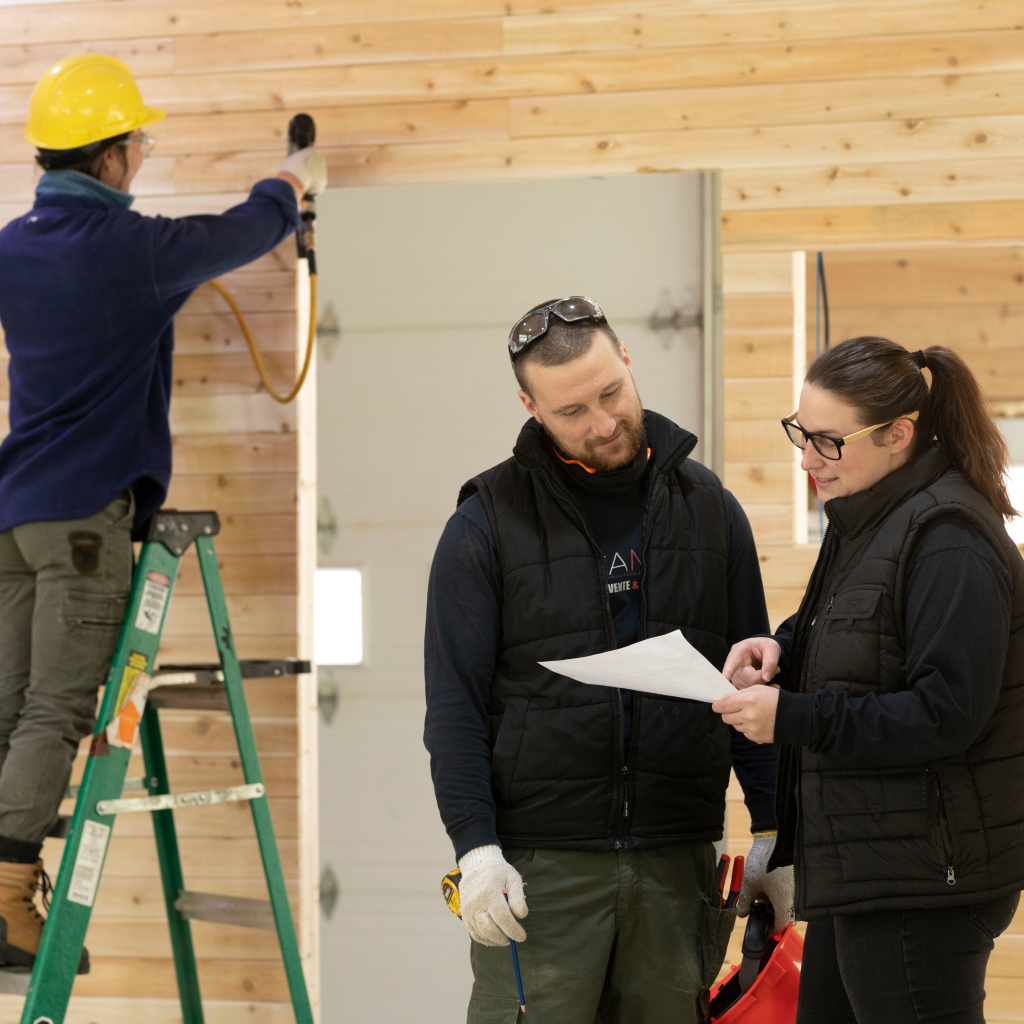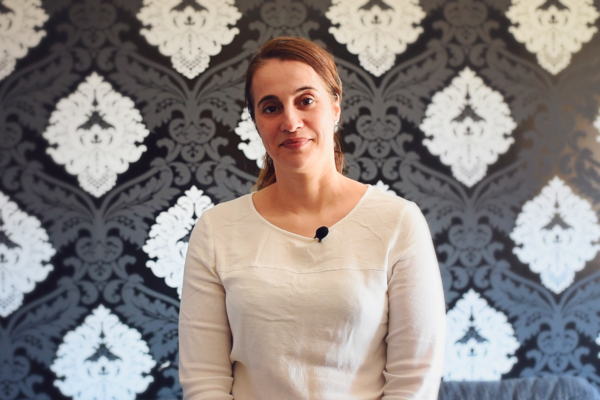We recently had the pleasure of talking to Camille Therrien-Tremblay, president and CEO of CAMM Construction and LIB Dépanneur. CAMM, the acronym for Construction d’Abris et de Micro-Maisons, designs and builds environmentally friendly mini units. LIB Dépanneur is a local self-service convenience store, open 24/7.
A bit of background
Born in Saint-Denis-sur-Richelieu to a family of entrepreneurs, Camille grew up in Bas-Saint-Laurent, in the village of Saint-Léandre, near Matane. Like most teens in remote regions, she had to leave her village at age 16 to pursue post-secondary studies. She studied film at college, rounding those studies out with a bachelor’s degree in communication, specializing in project management, from UQAM.
She stayed in Montréal after university and worked as a location manager for four years. Drawing on this experience, at age 21, she founded her first business, offering location and set management services.
Failure is just a step on the road to success
Although Camille was born surrounded by entrepreneurs, her first entrepreneurial experience wasn’t the success she had hoped for. Inexperience, youth, poor decisions… several factors had an influence. But this didn’t discourage Camille, who saw it as a learning experience. It was clear to her that she was going to start another business. And this time around, she used her experience to make better decisions and avoid the mistakes she made with her first venture.
This stage in her life marked a return to Matanie. She realized that the city’s hectic pace didn’t suit her. Plus, she felt that once it was time to start a family, she wanted to do it at home in Saint-Léandre. Au revoir, Montréal!

Generations of entrepreneurs
Entrepreneurship is in Therrien-Tremblay’s DNA. Her great grandfather on her father’s side founded Marchés Richelieu, her father established the L’Ancèdre sawmill on his grandmother’s land, after working as a building contractor in Montréal for a few years, and her uncle specializes in bio-construction.
Camille had a stroke of genius when building her own mini home. She described her experience as easy and enjoyable. All the possibilities she could imagine for these micro units started to whirl in her head; she knew she had found her path.
In 2022, she founded CAMM Construction Inc. which makes factory-built shelters and micro-habitats that can serve as mini homes, mini cottages, tourism offices, ready-to-camp shelters, and more.
Of course, before starting a business, you position yourself with your mission, vision, and values. For Camille, having eco-friendly products was non-negotiable. Her mentors – her father and uncle – had long been immersed in bio-construction, having long ago worked with architects who started LEED certification for buildings.
Environmental responsibility in construction requires ongoing reflection throughout a project. She considers the useful life of the materials used, ensures there is no waste of raw materials, sees to it that some materials can be recovered at the end of the habitat’s life, and so on. This approach requires greater attention, but the result is worth it.
The micro-habitats built by CAMM Construction are made from cedar inside and out. Which is convenient! Her father owns a cedar sawmill, right next door to CAMM’s premises. In using this locally purchased wood, Camille is significantly diminishing the carbon footprint of her projects.
A perfectionist deep in her bones, the entrepreneur always gives her all. She believes it is essential to give back to the community. She is involved in committees, boards of directors, and other local initiatives, because, as she points out, there is still a lot that needs doing in her region.
During a meeting of her municipality’s development committee, she learned that the last remaining local food retailer was closing its doors. Residents would now have to travel 25 kilometres to the nearest store for groceries. The RCM of Matanie had become a food desert.
Camille lightheartedly suggested, “Why not have a self-service dépanneur in a mini home?” A seed had been planted!

LIB dépanneur
Camille took the bull by the horns and decided to learn about self-service retail. This type of business has long existed in Asia and Europe, and Camille was won over by a Swedish concept.
Her efforts could now truly begin. First, she contacted the Swedish company to find out about the strengths and weaknesses of the concept, and she reached out to partners, such as the municipality and the RCM, to find out whether they were interested in collaborating on the project.
Six months later, business model in hand, Camille decided to start a new venture: LIB Dépanneur. This project was 95% financed.
“There are community assistance programs,” she says. “Financial aid and grants covered 95% of the costs. Plus, the municipality provided a parking spot with snow removal in the heart of the community. All we pay for is electricity.”
The concept is simple, and consumers have two options. At the door to the store, customers with smartphones scan a QR code, giving them access to Wi-Fi and then another QR code to unlock the door and enter the dépanneur.
Once inside, customers use their cell phones to scan the barcodes of the items they select and add them to their virtual basket. They pay with their credit card.
Customers who don’t have a smartphone or who aren’t comfortable with the technology can have a membership card that gives them access to the store. Inside, a payment terminal, like self-service checkouts found in supermarkets, is available to scan their items and take their payment via debit or credit card.


The future looks bright
There is no shortage of ideas in Camille’s entrepreneurial life. She is currently working on a construction project to supply mini homes in remote regions like Canada’s Far North, where housing is sorely lacking.
At the same time, she is planning to expand her workshop, which her business is outgrowing due to demand. Eventually, she also wants to take over from her father at the L’Ancèdre sawmill once he retires.
Once you realize that Camille has a young child and is highly involved in the community, your head might start spinning! But Camille wouldn’t change what’s she’s doing for the world. She is particularly proud of inspiring other women who want to go into construction trades. And none of it would be possible without the tireless support of her team, which is one of her greatest sources of pride.
If she had one piece of advice for someone who has a business idea, it would be to believe in your own abilities, to try, and to take it one step at a time.
• • • • • • • • • • •
Camille can count on the benevolent support of the regional director for Bas-Saint-Laurent, Nancy Dionne, who has spent over 20 years working in economic and sustainable development in her region. Known for her availability to the entrepreneurs she supports, Nancy takes a genuine interest so that each project can have an impact on the economic landscape of her region.
Thanks to the engagement of invaluable partners: Économie Québec, through its agent Investissement Québec, the Government of Canada, National Bank, the Business Development Bank of Canada (BDC), the Fonds de solidarité FTQ, and Fondaction, Evol has a large envelope to support, through conventional loans, businesses with inclusive, diversified ownership that generate positive social and environmental impacts in line with the UN’s sustainable development goals (SDG).






